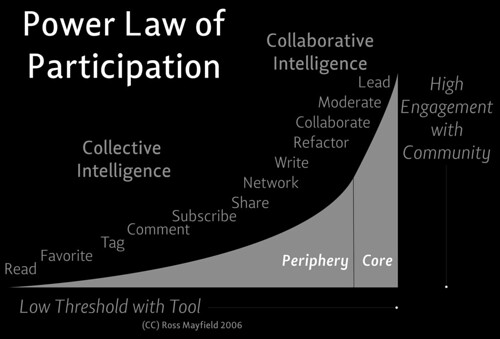Though delayed by a trip back to Michigan, an excellent week at the Constructing Modern Knowledge Summer Institute1, and now a week in Chicago while my wife attends a conference for work, I've been spending a lot of time thinking about my Masters project. Today, sitting in a coffee house on Michigan Ave., I started the writing. In the spirit of "publish, then filter," I'll be sharing my progress here.
Below is a basic introduction and rationale to my project. What I'd like from you:
- What do you think?
- Where are my ideas weak? wrong? incomplete?
- How could it be improved? modified? focused?
Feel free to be as critical as you'd like as long as the reason you're being critical is to help create a better project at the end of this process. 🙂
Rationale/Introduction
The purpose of the educational system in the United States has been described in many different ways depending on the viewpoint of the individual doing the describing. Creating individuals able to become positive members of society, providing skills for the future workforce, or preparing individuals for an uncertain future have all been cited by various people and organizations as the purpose of schooling- each relying on their own value set and particular social and political biases. While there is no doubt that these various beliefs about the purpose of the American educational system have been true, and may continue to be true in various times and places, it is this author's belief that one of the more important goals of the educational system is to create life-long learners who will be able to actively and knowledgeably engage in whatever ideas and issues may cross their paths. As specific knowledge and skill-sets are quickly changing due to the rapid increases in knowledge and improvements in technology, the importance of teaching students specific content knowledge decreases while the importance of teaching students how to locate, evaluate, and interact with knowledge increases. As what it means to be productive members of society or effective members of the workforce changes, the ability for individuals to understand how to learn new information when they need it is more valuable than simply falling back on information learned through formal schooling.
If schools are to become a place where students learn how to interact with, challenge, and develop new knowledge, then the traditional classroom structure- that of the teacher as the primary source of knowledge and assessment- needs to change as well. Students should be given a chance to work out the solutions to problems that do not have predefined answers. In doing so, students lose their status as passive recipients of knowledge and instead become active creators of knowledge. A method of implementing this might be built on the problem-based learning (PBL) model that was originally developed for medical students but has since been applied in all levels and disciplines. The incarnation of PBL envisioned here provides students with real-world problems to solve that do not already have easy or "neat" answers, gives students the freedom to explore down side canyons as part of the problem solving process, allows time for students to share their ideas and work with others, and provides support and time for students to document and reflect on their learning and problem solving process.
The model roughly outlined above might also be used between teachers to help them improve their teaching and the culture of their school. In this case, the real-world problems might be, "How do we improve communication between teachers?" or "What lessons and teaching models work the best?" or one of many other issues or ideas that could improve their skills as a teacher. As with the model used in the classroom with students, groups of teachers should have the freedom to explore ideas and issues that branch off from the original problem statement. Time must also be made for teachers to interact and share with one another through this process. This time might not necessarily be spent face-to-face, but rather online through various collaboration or communication tools.
As teachers utilize similar methodologies together through professional development as well as with their students in their classes, the two reinforce each other. Tools used to improve communication between teachers exploring an issue on how to change school culture, for example, might also be used to help students communicate with each other during their exploration of how the world might deal with the lack of oil as an energy source, and vice versa.
- posts on this topic coming soon [↩]

 well (
well ( pace of the other teachers. I did this even though we really weren't collaborating with each other, and looking back, I realize that I was really replicating was teaching style². No wonder I was frustrated. What I was doing was trying to do was suppress the style I had developed over several years of practice, research, and experimentation. It was foolish of me, and I now regret it.
pace of the other teachers. I did this even though we really weren't collaborating with each other, and looking back, I realize that I was really replicating was teaching style². No wonder I was frustrated. What I was doing was trying to do was suppress the style I had developed over several years of practice, research, and experimentation. It was foolish of me, and I now regret it. At best, this is how they worked.
At best, this is how they worked.